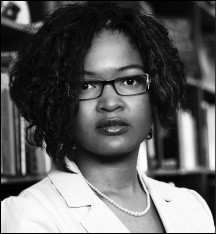The word “wench”: by definition, it referred to a girl, a young woman, or a maid in the 13th century and a wanton woman, a mistress in the 14th century. But in the 19th century, in America, wench could refer to a man’s mistress or to a black female servant of any age — which is what Lizzie, in a new novel called Wench (Amistad/HarperCollins), is: a slave in the pre-Civil War South and mistress to her owner, a white man named Drayle with a plantation outside Memphis.
But outside Tennessee, say, in the free state of Ohio, Lizzie would not only be slave and mistress, she’d be Drayle’s openly accepted companion at Tawawa House, a resort known for its cool springs and healing waters, which made it popular with Southerners. And it’s there that Lizzie meets other women — slaves and mistresses — over the course of several summers in the early 1850s: women such as Reenie, Sweet, and Mawu, who’s up from Louisiana with plans for escape.

Dolen Perkins-Valdez
Such a thought crosses Lizzie’s mind as well, but she has two children back in Tennessee, and she has Drayle to think of too — a man with all the allegiances to his race and to his class one would expect him to have, but he’s also a man capable of displaying uncommon tenderness when it comes to Lizzie and his children by Lizzie: a boy named Nate and a daughter nicknamed Rabbit. And as for Drayle’s wife, Fran? She herself lives according to the codes of public and private conduct that allow for such arrangements — not the least of those arrangements: Fran in one bedroom of the “big house”; Lizzie across the hall in another bedroom; both of them dependent on Drayle, subject to Drayle.
What becomes of the fictional Lizzie and Drayle and the whole cast of characters in Wench is the fine work of debut novelist (and native Memphian) Dolen Perkins-Valdez. But as for the real-life Tawawa House: The land it sat on became, in 1856, the site of Wilberforce University, a school expressly founded to educate African Americans, a fact that first caught the novelist’s attention — that and the fact that among its first students were Southern-born offspring of unions such as Lizzie and Drayle’s.
Perkins-Valdez — White Station High School grad; Harvard grad; creative-writing grad from the University of Memphis; and today a teacher in the writing department at the University of Puget Sound — splits her time between Washington state and Washington, D.C. But as she said in a recent phone interview, she keeps her hometown very much in mind. Memphians, in turn, have kept her in mind.
“My sales in Memphis have been phenomenal,” Perkins-Valdez said of Wench. “Up until a couple weeks ago, a full 10 percent of my sales were in Memphis, which is huge. Memphis can be a loving, supporting place when it comes to its own.”
The author then explained just how supportive:
“I had a reading in New York on January 16th, and it was with another author, a New Yorker. She’d been named by New York magazine as a writer ‘to watch.’ So people were pouring into the place, people she knew. I’m thinking nobody’s coming to see me. Then a group of 20 old Memphis friends walked in. It was nothing but love, and it deepened my love for my hometown” — a hometown Perkins-Valdez returned to after college and a year spent abroad.
That was when, after flipping through a U of M catalog, she took a course in creative writing from Tom Russell and, according to the author, “loved” it. And then, armed with an MFA in 1998, she married, gave birth to a daughter, and continued writing, with one short story landing in the prestigious Kenyon Review. After working on two or three “apprentice” novels, she felt Wench was “the one,” but she waited until the manuscript was “really ready.” And, apparently, it was. She got an agent based on it. Six months later, Amistad agreed to publish it. And six weeks after publication, Wench is going into its sixth printing — a sound start for any novel; a terrific start for Dolen Perkins-Valdez, debut novelist.
To learn more about Wench and about its author, go to dolenperkinsvaldez.com. And to hear directly from the author, go to npr.org, where she talked to Lynn Neary of the NPR News program Tell Me More. But to meet the author, be on hand when Dolen Perkins-Valdez reads from and signs Wench at Rhodes College. The event, on Wednesday, March 3rd, begins at 7 p.m. in Blount Auditorium inside Buckman Hall. For more information, call Rychetta Watkins of Rhodes’ English department at 843-3445.